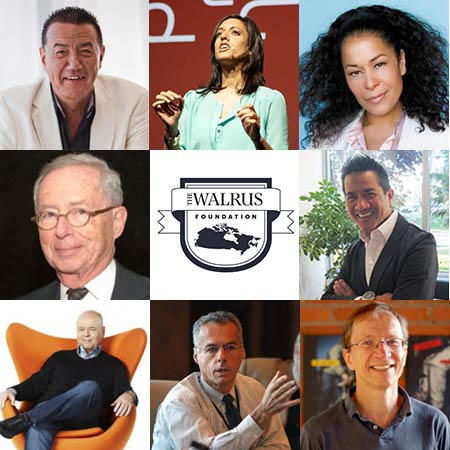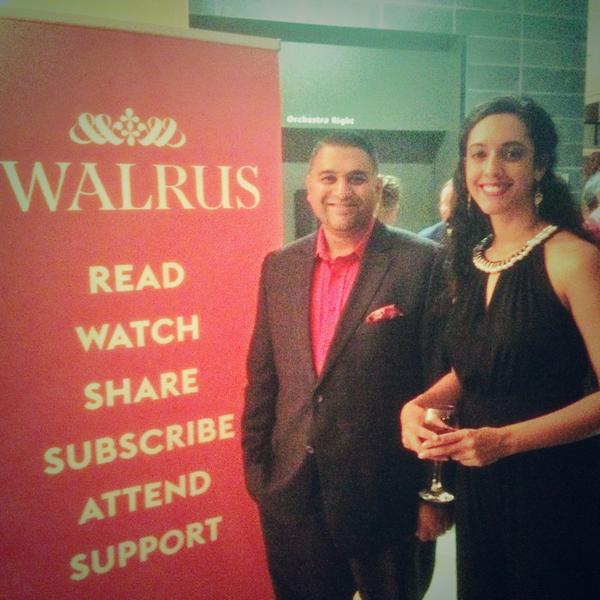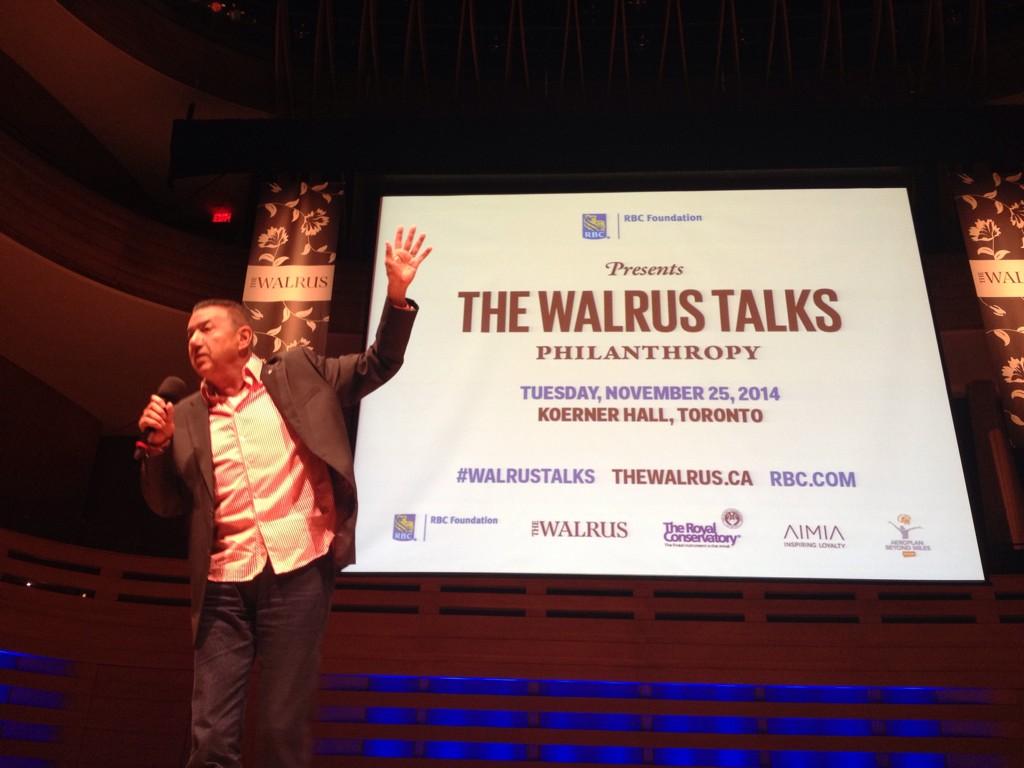
On Tuesday, November 25, 2014 we had the privilege of attending The Walrus Talks Philanthropy, presented by the RBC Foundation. It was eighty minutes of lively, thought-provoking ideas on the state of philanthropy, how we’re doing it wrong, how it can change for the better, and what giving really means. The event featured eight inspiring Canadians. Each speaker had only seven minutes, but in that short time they each had a remarkable impact on the audience, and the idea of philanthropy.
Entrepreneurial Philanthropy: A Mindset, Michael Koerner
Successful entrepreneur and philanthropist Michael Koerner has a straightforward approach to philanthropy: have great people, great ideas, and intelligent risks; and apply the same entrepreneurial principles to giving away capital that you apply to creating it. He spoke to specific projects he’s funded – premier mental health researchers and a hearing regeneration clinic at Toronto hospitals, and a world class concert hall at the Royal Conservatory of Music. All were close to his heart, but more importantly to him, they were doing unique things that would end up being self-sustaining. His even bigger idea? Foundations shouldn’t exist for longer than 20-25 years. Beyond that, he feels, and they get caught up in bureaucracy.
Secret of success? “Great people. Great ideas. Take intelligent risks” Nuggets of wisdom from Michael Koerner. #WalrusTalks
— Gabrielle Scrimshaw (@GabScrimshaw) November 26, 2014
Because of Billie, Molly Johnson
Leading in with the statement that “All of us are here because we’re standing on the shoulders of someone before us,” Molly Johnson spoke eloquently of her early years as a singer, and those who have helped to shape her – civil rights activists, her parents, and most notably, the influence of Billie Holiday. We all owe our success, in part, to others, which is why Johnson fundraises for the Boys and Girls Clubs at her shows to help kids get the right start in life. She left the stage challenging the audience, “Can you be the shoulders for others to stand on?”
“I’m nothing like Billie, I’m because of Billie.”—@themollyjohnson at #walrustalks, talking about those whose shoulders she stands on. — The Walrus (@walrusmagazine) November 26, 2014
Is today the day you dig in and find what you’re passionate about? Be the shoulder for others to stand on. #WalrusTalks
— Kavita Dogra (@KaveetsD) November 26, 2014
Putting the Profit in Non-Profit, Terry O’Reilly
90% of people would switch brands to be associated with a good cause. So what’s the role of profit in a non-profit world? O’Reilly works with an organization that has come up with a new and highly successful way of finding forever homes for children in foster care. But, as O’Reilly tells it, they cannot secure any corporate funding to continue their programs.
“The wood on doors [of corporations] is worn from so many people knocking…. What if the way in is profit?”
Though not aligned with traditional views of philanthropy, O’Reilly suggests that aligning charitable causes with products and profit is the way to solve social problems in our modern world. Is there a way for profits and non-profits to work together for mutual success?
‘The only place that ’cause’ precedes product and marketing, is in the dictionary’! Terry O’Reilly at #WalrusTalks pic.twitter.com/rnfsvTiwbt — Rasheeda Qureshi (@RasheedaQureshi) November 26, 2014
The Culture of Giving, Justin Poy
There is a culture of philanthropy in Canada, says Justin Poy, and a culture of buzzwords and jargon. In addition, Canada’s changing demographics hold new challenges and new opportunities for fundraisers. But instead of treating “diversity” as a strategy, fundraisers need take the opportunity to understand the history of their donors, and approach new donors with an understanding of where they have come from, and what might motivate them to give their money away.
Poy to fundraisers: “Think about the person you are going after. Look to their history before you start to build a strategy.” #walrustalks
— David (P) Leonard (@davidpleonard) November 26, 2014
Stop thinking of new immigrants as gold mines, says @justinpoy at #walrustalks #philanthropy. — The Walrus (@walrusmagazine) November 26, 2014
Solidarity, Gordon Floyd
Modern philanthropy requires action, and action requires motivation. But historically, people gave due to the values and communities born out of faith and religion. So how do we build communities that espouse the traditional meaning of philanthropy – a love of humankind – and, how do we motivate people to give in an increasingly secular world? These are the questions Gordon Floyd challenged the audience to think about.
The Body Always Gives a Shit, Sonnet L’Abbé
As an author of poetry, it was no surprise that Sonnet’s 7 minutes flowed eloquently from one idea to the next. “The less money you make, the harder it is to feel like your money matters.” The use of poems, layered over Shakespearean sonnets, led to a powerful dialogue about why she gives, and why she cares. “I give to focus the power I do have, and feel my impact on the world around me…. For a moment, I have the privilege of any wealthy man.”

Rethinking Foundations, Bill Young
The current structure of foundations doesn’t allow them to fulfill their missions as best as they could, says Social Capital Partners founder Bill Young. Because foundations are seeking longevity and financial security, they end up investing only a tiny portion of their assets in mission-related projects, while the rest is put in traditional investments. But what if foundations instead invested in projects or businesses that produce both a social and a financial return? They’d make more dollars available to fund socially good projects, while still making a financial return. The best of both worlds.
We need a foundation where the importance of mission trumps everything else. Bill Young at #WalrusTalks #philanthropy
— The Walrus (@walrusmagazine) November 26, 2014
Philanthropy as a Mindset, Tom Jackson
“If you don’t believe you can change the world, you’re not thinking right. Because you can.” Tom Jackson’s animated and passionate speech inspired the audience to think of philanthropy as a mindset. Jackson spoke of his difficult past, and the moment he woke up and became “addicted” to helping others. His annual Huron Carol performances have raised more than $200 million to for hunger-related causes. “Love is the leader. Lead by love. And you will change the world.”

The Walrus Foundation, publisher of The Walrus Magazine, is a charitable foundation. Donations made throughout December will be matched dollar for dollar (to a max of $25,000) by Donald K. Johnson. Mr. Johnson was integral in the campaign to eliminate the capital gains tax on gifts of securities to charities, something we think is awesome for Canadians and the charitable sector. To learn more about the Walrus Foundation, or make a donation of cash or securities, visit their charity profile page »
It was an inspiring evening that left audience members thinking differently about philanthropy, giving, and taking action to change the world. The full video of the event will be posted on Walrus TV.
Leave a Reply